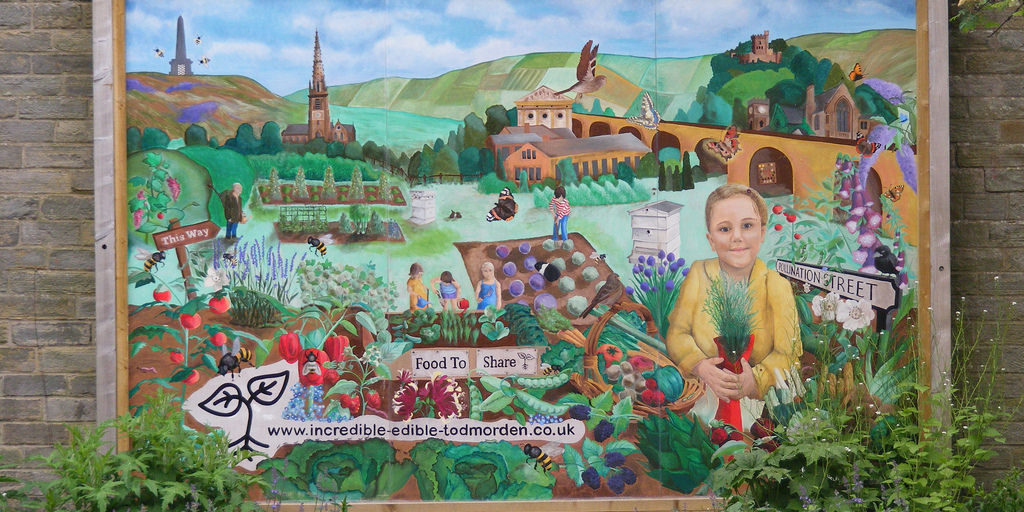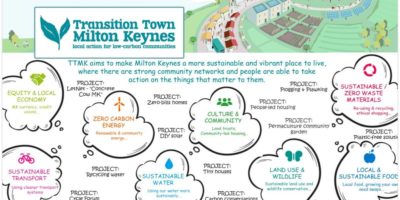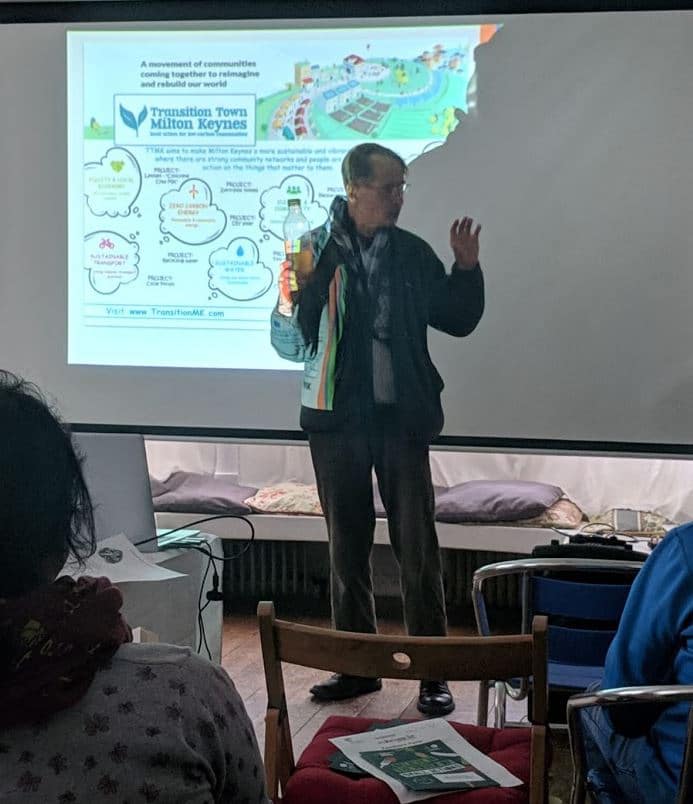On Saturday 27 October our Planting Up group hosted a free event at Westbury Arts Centre that we simply called: “Incredible Edibles!”
I’m pleased to say the event delivered on it’s promise to celebrate the power of food. What I hadn’t expected was for it to open my eyes to a completely new way of thinking about food too.
Planting Up - An Introduction
As the host representing Planting Up for the next 3 hours I kicked things off with a brief talk about our permaculture project.
This entailed an overview of what we’ve been doing over the last year with pics to show how we’ve transformed the grassy garden wilderness at the front of Westbury Arts Centre to a community-orientated permaculture plot.
I mentioned how the three permaculture ethics – People Care, Earth Care and Fair Share – formed the basic framework for why we do what we do on our Planting Up project. The main take-away was that growing our own food in these permie ways provides all sorts of benefits for people, the environment and local community – including:
- improving personal health & well-being – from getting outdoors to do some social gardening
- connecting us to our community – bringing people together to work, eat and learn
- creating wildlife habitats that encourage biodiversity – by creating an environment of companions where everything supports each other
- increasing soil fertility to help reverse climate change – because healthy soil provides the largest store of terrestrial carbon
- promoting a sharing economy for greater resourcefulness and resilience – working with local people and businesses for people not profit
Food that's Changing our Landscapes
Guest speaker, Sahira Ward, stepped up for the main talk of the morning to take us on a journey of discovery about how we can all grow food just about anywhere (- from schools and car parks to green spaces outside shops, doctors’ surgeries and police stations).
Not only did Sahira show us what it takes to set up your own Incredible Edible site, just as her volunteer group has done in Dunstable. She also introduced us to the inspiring action of Incredible Edible and how this network of normal people like you and me are stimulating communities to grow and change their landscape all over the UK (and the world).
The inspiring narrative of Incredible Edible is based on having some values, stories to share and a lot of passion and kindness.
This was exactly what Sahira and her team brought with them too. It was great to have them involved, not to mention a pleasant surprise to receive the assortment of seeds and strawberry plants they brought along to share too.
With Incredible Edible, there are no rules. Just the simple philosophy that: “If you eat. You’re in!” It really is that straight-forward – just as the video below proves…
Here Pam Warhurst tells the story of how she and a growing team of volunteers turned plots of unused land into communal vegetable gardens, putting food at the centre of their community…
Preserving Food... With Benefits!
After the tea/coffee break where the group got to indulge in some homemade cakes, a couple of our Planting Up volunteers, (Frances Fox and Abigail Stephenson,) shared some of their fruit and veg preserving tips.
We got to see, smell, feel, taste and hear about how their glut of tomatoes, apples, raspberries and quince from this summer’s harvests had been put to good use through various preserving methods. Details included everything from dehydrating and freezing, to jam, chutney making and pickling. We also got to sample some of Frances’ delicious green tomato chutney from a family recipe that has been passed down through generations.
Abigail followed up with a lively demonstration about fermenting that was linked to the importance of looking after your gut “garden” biome for a healthy mind and body.
Abigail promised she wasn’t on commission when she promoted Michael Moseley’s latest book (of “Trust Me I’m A Doctor” TV fame): “The Clever Guts Diet“. Her point was that fermenting fruit and veg can be a very affordable and easy way of preserving that can also help you feed your good gut bacteria.
We all got to taste Abigail’s fermented food home-made kimchi recipe and in so doing did a little something to look after our own gut microbiome there and then too!
Transition Town Milton Keynes (TTMK) is changing the world
Representatives from TTMK, Hilarie Bowman and Michael Sheppard, were next to take to the floor. Together they delivered an interesting talk about the voluntary work of TTMK which reiterated the power in small actions message.
In the same way that the father of the the Transition concept, Rob Hopkins, proposed, Hilarie and Michael gave examples of positive local solutions that have become self-sustaining TTMK projects. This resonated a powerful reason why we shouldn’t feel paralysed by the enormity of the climate change and peak oil ecological issues confronting our world today. This approach, from my point of view, evokes a real sense of empowerment from the knowledge that people are working together on small actions to contribute to a better future – in the same, permaculture-inspired way that Transition Towns everywhere are changing the world.
By no means was their talk a rallying call to inspire the movement of our community in rebuilding our world. Although you could take that from it if you wanted. Instead, they presented an informal chat that gave us insights into TTMK projects and the volunteers involved in them that elicited a feeling of how we all have this personal responsibility. They showed us how we can all start by taking action on the things that matter to us to make a difference individually. The point being that even the smallest actions we do at home and at work will make an increasingly big difference when more and more of us do them.
What I really admire about TTMK is that they show us how we can act more sustainably. They don’t take the usual narrative of telling us that we need to be acting more responsibly and give us all the horror stories of doom and gloom about why. Instead, they present solutions that we can all do and that are often in place and in action already for us to connect with.
Although it might take a bit longer for people to embrace the composting worm tea/pee as enthusiastically as Michael (pictured). It’s easy to appreciate how we can all do our bit – particularly to make a significant impact by reducing, reusing and (as a final option) recycling our consumables, not least our food!
What if Food Waste was put into Monetary Terms?
Our final speaker of the day, Helen Innes from Milton Keynes Community Fridge, gave us a thought-provoking new angle on the enormous scale of our food waste problem in MK and the UK overall… She told us that, in monetary terms, the average UK household throws away over £470 worth of food every year.
In terms of volume, this equates to over 4.1 million tonnes of food going to waste that is completely avoidable because it could have been eaten if it had been better managed.
MK Community Fridge based in The Old Bath House Community Centre, Stratford Road, Wolverton, (like other Community Fridges before it) is a tried and tested solution to stop good food like this ending up in the bin. The idea is simple really – A Community Fridge enables residents and businesses to share surplus quality food that would otherwise be wasted to give to local people that need/want it.
MK Community Fridge has only been running since July 2017 but in it’s first year managed to divert more than 15 tonnes of food from the bin to the people of MK. Now that’s pretty amazing! And when you’re reminded, as Helen did, that 1 in 5 children are living in poverty in Milton Keynes, this story takes an incredible turn.
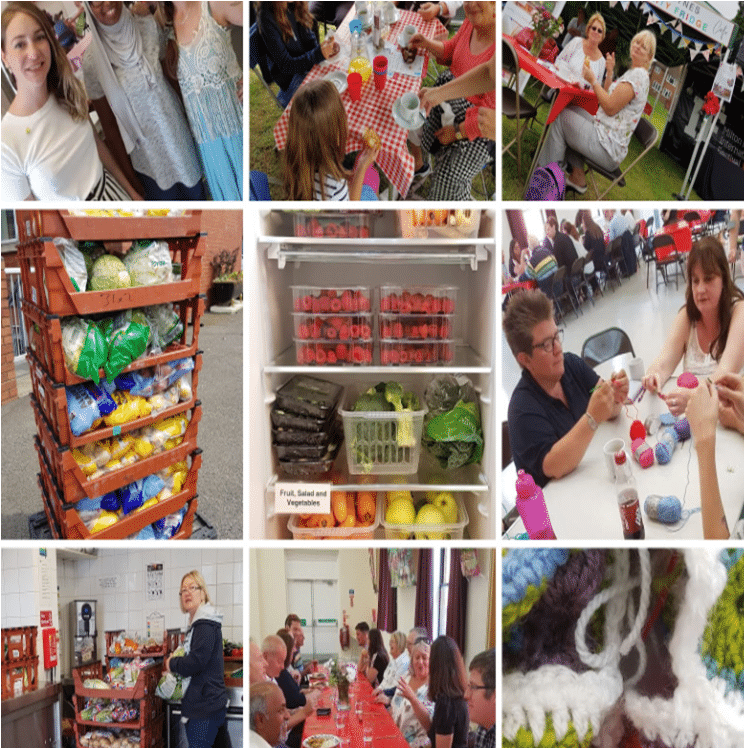
Helen’s talk was another one that was full of passion and energy about the power of food. Her presentation contained lots of pictures on a loop showing us how her project is not just about reducing food waste but also about sharing it with the local community – not just on the shelves of the Fridge, but with events and how every part of the distribution chain can work together for positive change to prevent us taking food for granted.
Ending on a good news story, we learnt that there are two more Community Fridges coming to MK soon – at Daisychain Children’s Centre and Woughton Community Council.
In the End...
Home-made vegetable soup and snacks (made from leftover food kindly donated by MK Community Fridge) proved a popular reason for attendees to stay and chat over some lunch at the end of the event.
Following that, we finished with a group walk around the Arts Centre and the gardens (to see the permaculture plots, 100 year-old apple tree, wildflower meadow and beehives amongst other things) before everyone went home.
The positive feedback and gestures of support we received from people after the event told us that this wasn’t really the end.
We have the potential to make a real difference to our lives and make Milton Keynes incredible through the power of food…
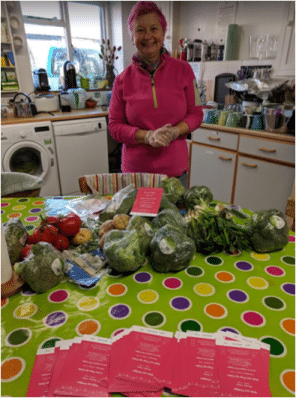
Let’s Start a Food Revolution!
This event reminded me how easy it can be to take food for granted, but that with a more mindful attitude to it, how it can bring people together to create a kinder, more resilient and more connected community.
I came away from this event inspired by the initiatives we’d been shown and the passionate people involved in making a difference through food.
It was amazing to learn how even the smallest efforts to grow, preserve, share and better manage our food consumption can help us all to save money, live a healthier lifestyle, connect with each other and protect our planet for future generations.
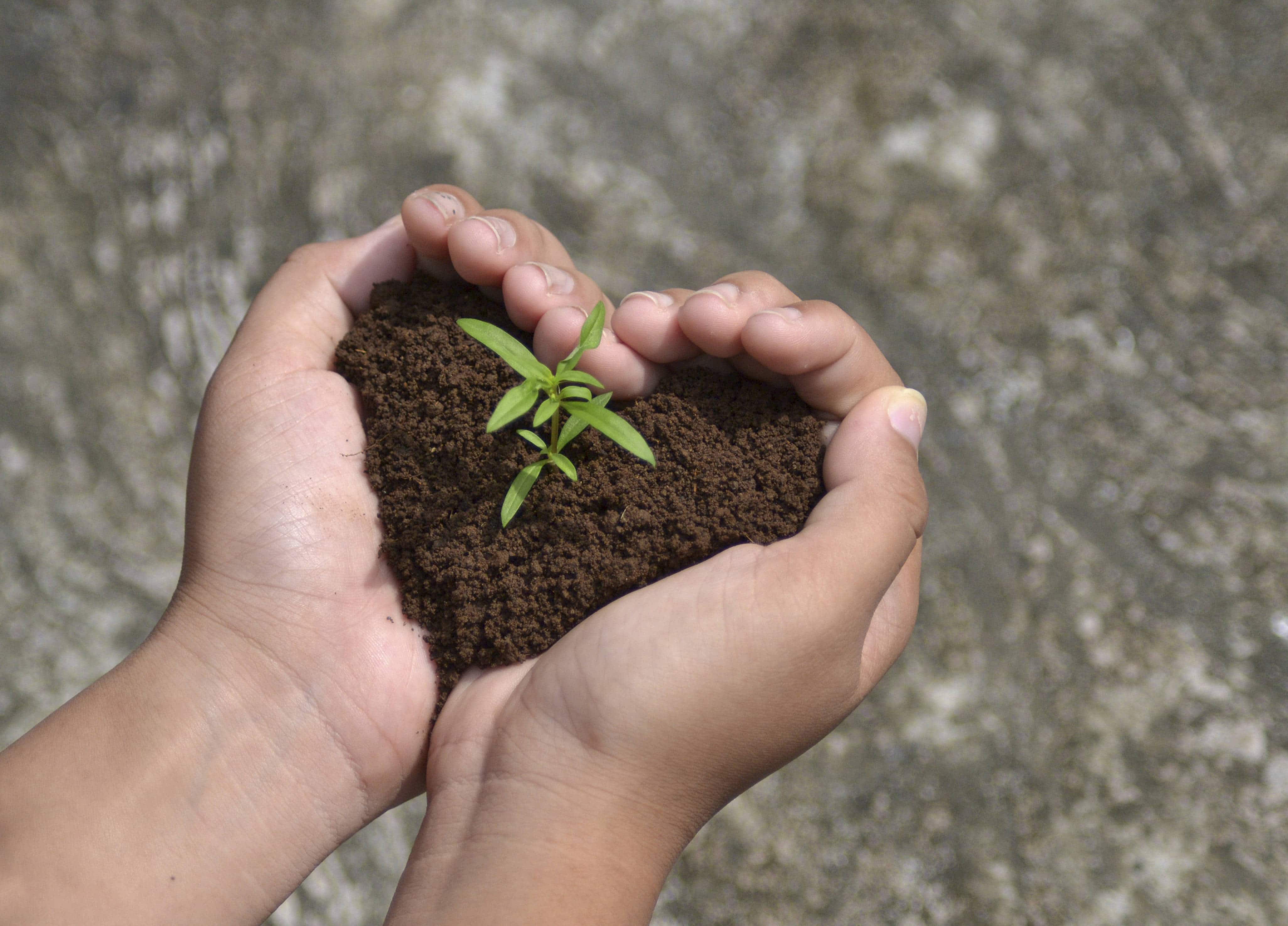
The really heart-warming bit is that it doesn’t really take much of a leap to imagine what a movement like this could do!


